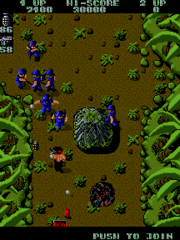 In 1986 SNK released Ikari Warriors, it had all the makings of a classic title. Cool weapons, time strategies, two player action and a great challenge. We’re now seeing folks reproduce some of the essence of classic games by creating platformers like Little Big Planet and Mega Man 9, where is the love for the top-down scrollers?
In 1986 SNK released Ikari Warriors, it had all the makings of a classic title. Cool weapons, time strategies, two player action and a great challenge. We’re now seeing folks reproduce some of the essence of classic games by creating platformers like Little Big Planet and Mega Man 9, where is the love for the top-down scrollers?
Ikari Wariors was one of the first game titles to use a rotary joystick along with a directional system. Looking at the current generation Xbox 360 and PlayStation 3 it’s plain to see the joystick is equipped with this design. We’ve seen Geometry Wars utilize the analog stick to create a 360 directional attack, so it’s possible to utilize this behavior for Ikari Warriors.
Given SNK is still alive under the name SNK Playmore the intellectual property must still exist to breath fresh life into an Ikari Warrior remake, with about six to eight months development time a classy title could be re-developed using old concepts brought to the current generation hardware.
Blast grenades, RPG’s, smart bombs, air strikes the options are limitless and the concept has been proven to work. Given the gamer demographic of 18-34 it’s plain to see old gamers of the Arcade and NES would recall and rebuild their love for the title while attracting younger audiences whom have never seen an Ikari Warriors title; if it worked in 1986 are we so adverse to it working again?
Games do not have to implement full 3D perspective graphics to be cool, we’ve seen proof in that with the Wii and the demand for titles like Little Big Planet. We neeed another Ikari Warriors.

 Famitsu Magazine is reporting the Nintendo console, Wii, has managed to sell 7-million units in Japan. This is roughly three times the number of Sony’s PlayStation 3, the console with superior graphics and power.
Famitsu Magazine is reporting the Nintendo console, Wii, has managed to sell 7-million units in Japan. This is roughly three times the number of Sony’s PlayStation 3, the console with superior graphics and power. In 1986 SNK released Ikari Warriors, it had all the makings of a classic title. Cool weapons, time strategies, two player action and a great challenge. We’re now seeing folks reproduce some of the essence of classic games by creating platformers like Little Big Planet and
In 1986 SNK released Ikari Warriors, it had all the makings of a classic title. Cool weapons, time strategies, two player action and a great challenge. We’re now seeing folks reproduce some of the essence of classic games by creating platformers like Little Big Planet and
@Duke Nukem Forever review fiasco:
This one is almost ‘no comment’. The nasty side is what Jordan said (except foe Jonah I can’t yet distinguish your voices, sorry if I mix you up): they don’t mind blacklisting, they just don’t want it to be public.
@ Apple will be the games industry in 10 years:
You can even devise a control scheme for touch based interfaces, but!
Just like console controllers, a mouse and keyboard using player will best one using a console controller, in competitive gaming.
Jonah, I’m with you on the real books vs. kindle. Don’t get me wrong guys, that’s a device that I like, but it doesn’t hold a kandle 😛 to a real book.
@ No need for PS4, PS3 now hitting its stride:
Erm, hello, PS3 is hacked? Piracy will be as rampant on PS3 as is on PC? PS3 might become a very unattractive platform to develop for? (hard to code for it and with it’s DRM system exposed for all to pirate your product).
😀 Jonah, thanks for pointing out misspellings, it’s useful to me.
@Question of the Week:
I do care what it says in the review. I do want to read if a certain aspect is flawed: perhaps it is a feature that interests me, and in that case I’ll skip the game.
As for the score versus the entire contents, well, it actually depends on the value of the score.
If it’s below 5, then I don’t even bother to read the review. The score weights 100%.
If it’s up until 7, the score weights 50%. Above 7, it’s really up to the contents of the review, not the score: weight drops to almost 0%.
Just to let you know that things in Australia aren’t that bad. If one looks around abit you can get a good deal on games even if they are brand new. Granted prices have been $110 for some games but with some skill you can get it imported from the UK with shipping for nearly half the price. I havn’t brought a game from a major Australian retailer for some time now. Feel sorry for those who do ouch.